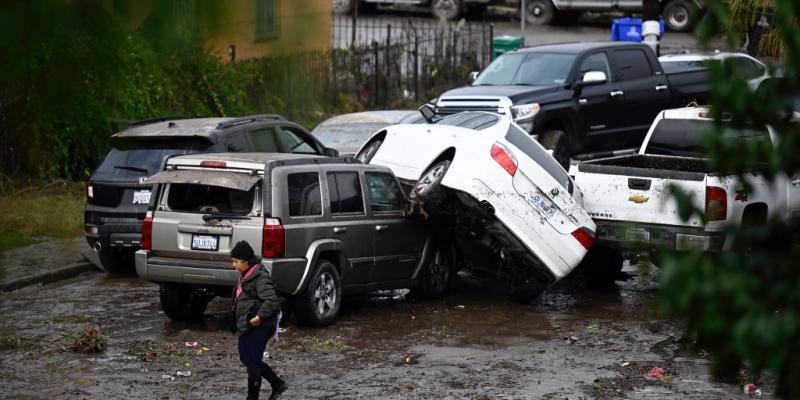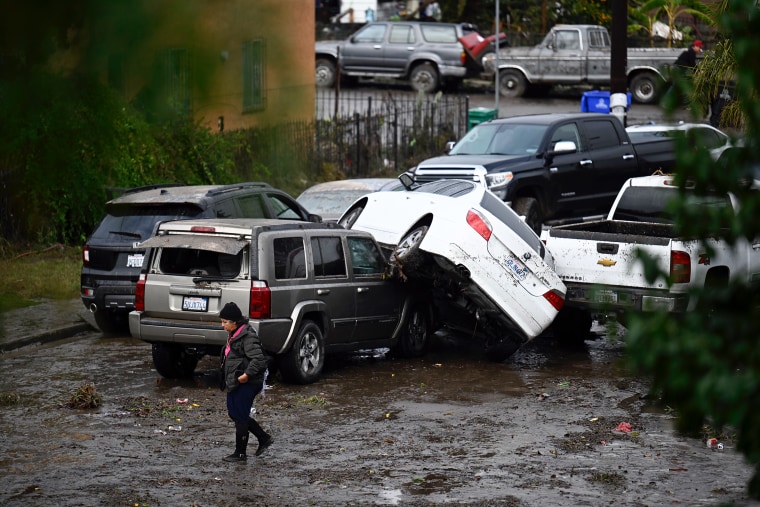San Diego sees widespread flooding during wettest January day on record



SAN DIEGO — Winter storms for relatively dry San Diego are hit-or-miss, but mostly miss, so the wallop of a Pacific front Monday stunned California's second-largest city even as it was expecting rain.
It was the third of three Pacific storms to strike the West Coast since Friday, with the first bypassing the region and the second producing only about one-third of an inch of relatively warm rain. A city that walked it off was then punished by the third storm, which had been forecast to be stronger.
It was the wettest January day on record in San Diego, the National Weather Service said.
Tijuana and other parts of northern Baja California were hit hard. At least eight migrants were rescued by U.S. Customs and Border Protection agents and San Diego Fire Department rescuers when they were endangered by the floodwaters of the Tijuana River Valley on the U.S. side, authorities said.
Residents in the Southcrest neighborhood just southeast of downtown had to be rescued by firefighters as standing water quickly surrounded their apartment complex, according to authorities and coverage from NBC San Diego. No injuries were reported.
Navy Base San Diego, south of downtown, reported flooding in the late morning as a thick cell of precipitation moved over the area and put multiple streets and Interstate 15, which leads to Las Vegas, under enough water that they were effectively shuttered.
Navy officials said personnel on base should shelter in place as they tried to move incoming and outgoing traffic to areas of the base that weren't temporarily united with adjacent San Diego Bay.
Mayor Todd Gloria declared a state of emergency "due to extreme rainfall and flash flooding," he said. He urged residents and visitors to stay off roads Monday. Schools in adjacent La Mesa and Spring Valley declared classrooms would be closed Tuesday.
The city grappled with flooding in the usual places, including Mission Valley, where multiple roads were impassable, and Ocean Beach, where beachgoers didn't necessarily have to reach the ocean to go for a swim.
At the north end of San Diego County, State Route 78 was shuttered east of the city of Oceanside after lanes were buried in floodwaters. Eastbound lanes remained closed Monday night, according to the California Transportation Department.
The scene was similar across the region as the storm drew moisture from the Pacific and formed an atmospheric river, what the National Oceanic and Atmospheric Administration calls "rivers in the sky," which produced once-in-a-generation effects.
 A woman walks by cars damaged by floods during a rainstorm in San Diego on Monday.Denis Poroy / AP
A woman walks by cars damaged by floods during a rainstorm in San Diego on Monday.Denis Poroy / AP
The storm echoed the havoc of El Nino in 1983 or 1998 — classic years for the rainy weather phenomenon that brought widespread flooding, sizable surf and even weeks of snow to Southern California.
Monday's storm spun at the coast counterclockwise and hit northern Baja California, giving San Diego a glancing but still strong blow, NWS meteorologist Brandt Maxwell said.
The long-tail jet stream, a permanent feature that usually aims storms much farther north, and the strong atmospheric river paired up with unstable air composed of warmer atmosphere colliding with colder climes, Maxwell said. Together those elements charged up the day's storm.
The only thing missing, Maxwell noted, was strong wind.
San Diego's rain amounts have been well below normal this season, which started Oct. 1. But this single storm brought the city to slightly above normal for the year, Maxwell said.
There's still essentially half the rainy season ahead, and average annual rainfall is nearly 10 inches. The storm gave San Diego enough rain to put its season-to-date precipitation at just a hair under 5 inches for the season, Maxwell said.
To continue on a normal track or even produce an above-normal year of precipitation that would justify predictions of a rainy El Nino year for California, the Southern California coast will have to have more days like this.
It's rare to get much needle-moving precipitation past the end of March. The storm is most likely the last one like it for January.
"At least in the short term, it doesn't look like there's a whole lot on the horizon for Southern California," Maxwell said.






